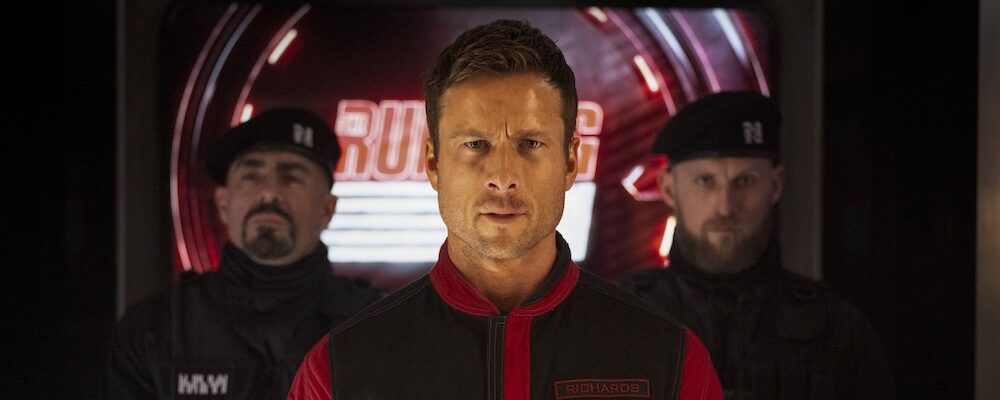‘The Running Man’: Glen Powell Rushes Through Dystopia in Edgar Wright’s Eye-Popping Stephen King Adaptation
Alci Rengifo
Maybe Stephen King was ahead of the curve all along. Famous for his horror novels, King has lately seen a cinematic and TV surge of his dystopias. It could be because they tap into themes that are so glaringly American and stubbornly contemporary, like our addiction to media and spectacle. Edgar Wright is perfectly suited for King’s “The Running Man,” as a director who specializes in using everything from comic books to video games in his aesthetic. This movie does have the high-speed rhythm of a game, at times becoming a bit overwrought. Yet, Wright’s craft is always evident and he never cowers away from an explicit political message.
Most of the familiar elements of the premise are kept intact. Ben Richards (Glen Powell) lives in a dystopian future where the poor are even poorer. America is now literally run by corporations. He has been blacklisted due to having been fired from past jobs for insubordination, including leaking corporate documents. Ben also has quite the temper. At his cramped home with wife Sheila (Jayme Lawson), he despairs over not being able to afford proper medicine for their chronically ill daughter. Sheila has no choice but to go back to working nights at a sleazy-sounding joint. Seeing no other options, Ben decides he will enter “The Running Man,” a live show hosted by Bobby T (Colman Domingo) where society’s outcasts, or condemned, are meant to outrun “Hunters.” If you can last 30 days without getting killed by the Hunters or turned in by common citizens for a reward, you win immense riches.
The King novel was first published in 1982 under the pseudonym Richard Bachman and was adapted into a 1987 movie starring Arnold Schwarzenegger as Ben. To this day it is not considered one of Arnold’s best, even as it entertains as a guilty pleasure. In that version directed by Paul Michael Glaser, the emphasis was on satirizing people’s addiction to TV and video games. Ben was a military captain condemned to the show for refusing to mow down a crowd of protesters. That was about as political as the premise got. The various Hunters were hilariously-imagined killers wearing costumes out of a bad cosplay party. Wright conjures a whole vivid world that feels quite plausible. The look of the film is the real star. It is a dystopia where everyone is aware they are being watched but don’t care because corporations provide bloodthirsty entertainment all day. Even if cities look ever more decayed, there are screens and gadgets everywhere for distraction. In other words, this is a future that looks close enough to our time where the citizens wouldn’t even notice the moment corporate fascism took over. Dan Killian (Josh Brolin), the executive producer of the “Running Man” show, is a perfect satirical representation of the CEOs cynically producing garbage for the masses. He describes the program as a modern version of Ancient Rome’s gladiator games.
As far as titles go, this one is absolutely accurate. The moment Ben is thrown out into the world to evade the Hunters, the movie never stops. Cinematographer Chung-hoon Chung and editor Paul Machliss are a tag team bent on outdoing the frenetic pacing of Wright’s famous entertainments like “Baby Driver” and “Hot Fuzz,” with the graphic novel energy of “Scott Pilgrim vs. the World.” Like some kind of twisted arcade game where we are merely viewing, Ben must outsmart the pursuers and live drone cameras hoping to transmit his eventual demise. As he dons various disguises and sends required video messages back to the show (which he uses to issue snickering takedowns), a parade of other characters fly by including an equipment dealer (William H. Macy) and an underground podcaster (Daniel Ezra) obsessed with exposing the game’s rigged system. “Scott Pilgrim” star Michael Cera pops up as well as a vengeful oddball. You almost have to focus extra hard to realize Wright throws in a few Stephen King Easter Eggs, like Schwarzenegger’s face on the currency or mail being sent off to the town of Derry.
The images of “The Running Man” eventually outrun the script. Wright’s vision of the future is frighteningly familiar in the way it portrays a society where everyone works to death just to avoid poverty. There are long food lines Ben passes by and showmen like Bobby T (Domingo again being superb) selling everyone a glittery illusion of the American Dream. We cannot deny this is a society increasingly dependent on spectacle, where people will go to any lengths via technology and the internet to get quick fame, desperate for fast wealth. If there is a flaw it is that the movie never slows down to truly let the characters and deeper meanings expand. Wright and team get too worked up throwing Ben down fiery sewers or evading bullet showers from the main, masked Hunter. Ironically, the film threatens to become the very shallow escape the plot critiques. Yet, Wright remains a wonderfully visual director who crafts images of incredible detail. “The Running Man” would do better catching its breath, but what it’s trying to say can be chillingly familiar.
“The Running Man” releases Nov. 14 in theaters nationwide.

